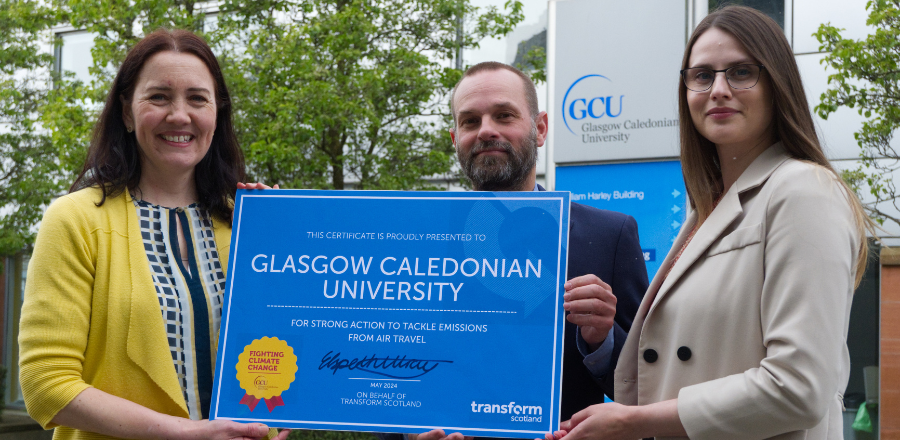University sustainable travel progress showcased by Transform Scotland

The University’s Sustainable Travel Plan (STP) has been lauded by Scotland’s alliance for sustainable transport.
Transform Scotland, which brings together public, private and third sector organisations from across Scotland, praised Glasgow Caledonian’s approach to sustainable travel in a report published this week.
As part of its commitment to carbon neutrality by 2040, the University’s Climate Conscious Travel & Expenses Policy (a deliverable of the STP) encourages all staff to minimise the overall number of journeys taken on behalf of the institution and specifically discourages flying to destinations that can be reached by train in six hours.
Since its launch in 2022, the policy has delivered a 660 tCO2e reduction in the University’s carbon footprint and cut 27% from business travel emissions − smashing the target set for 2025-26 by 400 tonnes.
Paulo Cruz, the University’s Head of Operational Sustainability, said: “Travel is a significant component of our carbon footprint and everyone at the University is focused on doing their part to address the climate emergency. Choosing more sustainable modes of travel is essential to this and the University’s commitment to openly and transparently reporting its travel emissions helps everyone make informed decisions about how to travel.”
This achievement was acknowledged by the Transform Scotland report Fight or Flight, which collected data from extensive Freedom of Information requests. The report investigated the travel patterns and policies of more than 150 Scottish public bodies, which included: local authorities, NHS trusts, colleges and universities, police and fire services, and a wide range of organisations working in the environment, science, the arts, social care and other sectors.
Transform spokesperson, and report author, Elspeth Wray said: “Rail is now winning out over air for trips to London and we’re pleased that Scotland’s public sector is taking action to tackle climate emissions by cutting back on domestic flights. Over the past decade, public bodies have doubled the share of trips from Edinburgh and Glasgow to London trips that are being made by train rather than plane.
“There are some great examples of climate-friendly public sector leaders. We’d highlight organisations such as Glasgow Caledonian University, whose policy specifically discourages flying to destinations that can be reached by train in six hours.
“We urge all public bodies to follow the example of sector leaders, for example by ruling out flights between the Scottish Central Belt and London and setting strong emissions reduction targets for air travel.”
